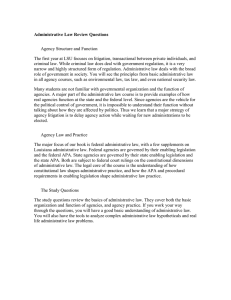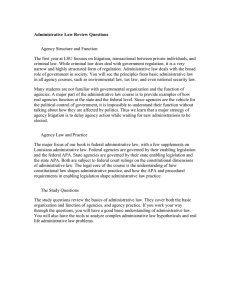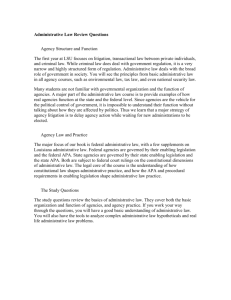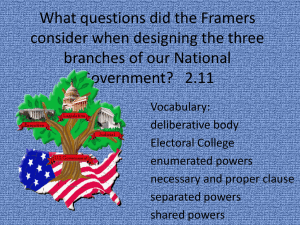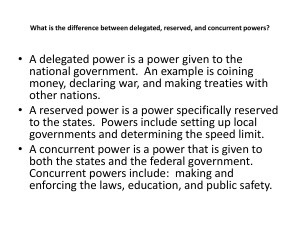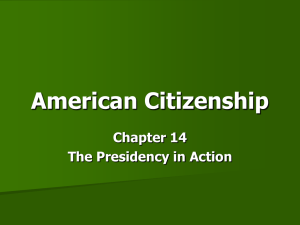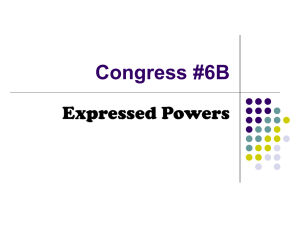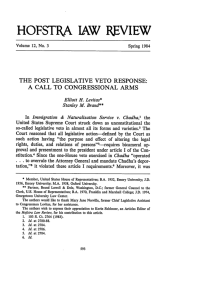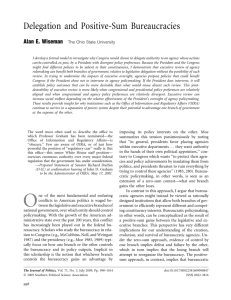Administrative Law Review Questions
advertisement
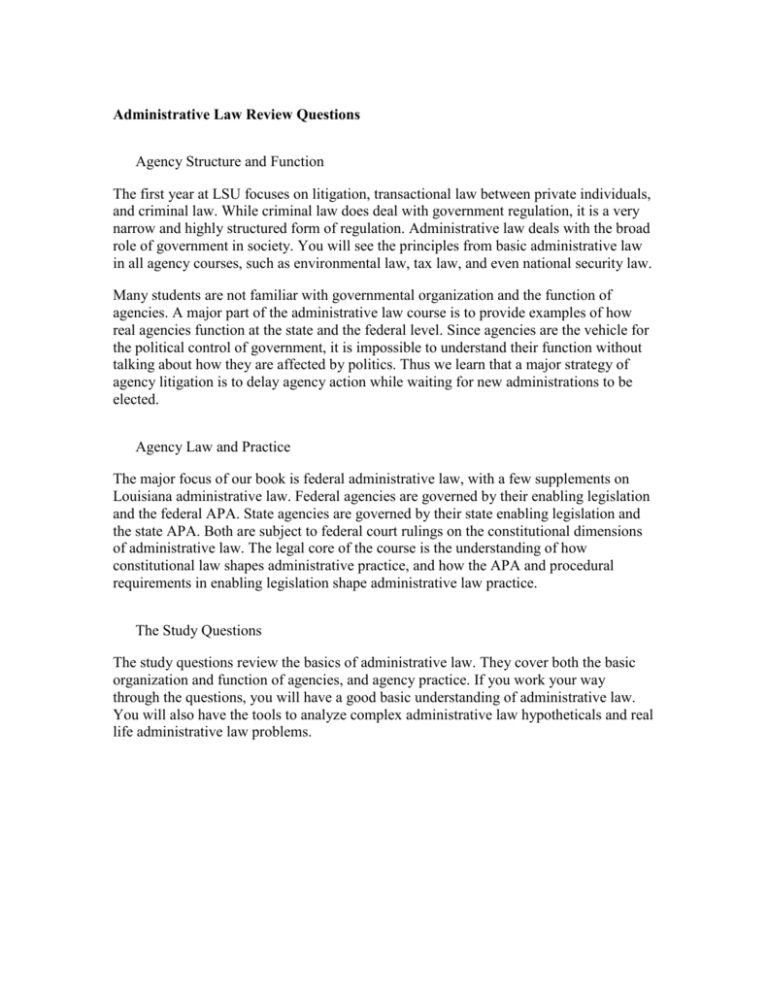
Administrative Law Review Questions Agency Structure and Function The first year at LSU focuses on litigation, transactional law between private individuals, and criminal law. While criminal law does deal with government regulation, it is a very narrow and highly structured form of regulation. Administrative law deals with the broad role of government in society. You will see the principles from basic administrative law in all agency courses, such as environmental law, tax law, and even national security law. Many students are not familiar with governmental organization and the function of agencies. A major part of the administrative law course is to provide examples of how real agencies function at the state and the federal level. Since agencies are the vehicle for the political control of government, it is impossible to understand their function without talking about how they are affected by politics. Thus we learn that a major strategy of agency litigation is to delay agency action while waiting for new administrations to be elected. Agency Law and Practice The major focus of our book is federal administrative law, with a few supplements on Louisiana administrative law. Federal agencies are governed by their enabling legislation and the federal APA. State agencies are governed by their state enabling legislation and the state APA. Both are subject to federal court rulings on the constitutional dimensions of administrative law. The legal core of the course is the understanding of how constitutional law shapes administrative practice, and how the APA and procedural requirements in enabling legislation shape administrative law practice. The Study Questions The study questions review the basics of administrative law. They cover both the basic organization and function of agencies, and agency practice. If you work your way through the questions, you will have a good basic understanding of administrative law. You will also have the tools to analyze complex administrative law hypotheticals and real life administrative law problems. 2 Chapter 1& 2 Federal Governmental Organization What are the three branches of the federal government? How is separation of powers intended to prevent any one branch of the government from dominating the other branches? How did the development of political parties undermine the effectiveness of separation of powers? What are the exclusive powers of the House of Representatives? What are the exclusive powers of the Senate? What is the only joint power? If this power is used, does the constitution provide for how the process will be ended? Does the constitution lay out clear guidelines for administrative law? Why? What is the key factor that determines whether an agency must be in the executive branch? What is an example of an agency that is controlled by Congress? What powers can a Congressional agency exercise? The Delegation Doctrine and Constitutionality of Administrative Law At one point, the United States Supreme Court was divided over whether legislative and judicial power can be delegated to agencies. The court eventually accepted the constitutionality of delegating these powers to agencies and the question shifted to whether congress has properly done the delegation. What is the modern test for whether the delegation of power to an agency has 3 been properly done? Why is this test based on whether the courts can review whether the agency’s use of the delegated power is consistent with the intent of Congress, i.e., why is the critical issue for judicial review? If the statute delegating the power to the agency is general, such as protect us from dangerous diseases, what can the court look to in deciding if there is enough background to review the agency’s actions? If the court cannot find enough evidence of congressional intent, does the court treat it as an unconstitutional delegation or is there now another solution? May Congress delegate the power to adjudicate criminal penalties to agencies? Why are criminal penalties limited to Article III courts? If a city wants to have traffic tickets adjudicated by an ALJ, rather than a municipal judge, how must the city change the penalties? What rights will the defendant lose when this becomes an administrative review? Congressional Control of Agencies What is the congressional power over agencies, i.e., how are agencies formed, where do they get their legal powers, and how are they financed? What was the Great Compromise between the large and small states that lead to the organization of the Congress? How does this compromise affect the politics of the two bodies? What are bicameralism and presentment? Why is bicameralism critical to the Great Compromise? What are the president's options on vetoing legislation and how may congress override a veto? What is the source of Congressional power over aliens? Must Congress treat all persons who come to the US the same? For example, are Haitians subject to the same immigration rules are Cubans? Why isn’t this an equal protection problem? If a person who is illegally in the US is accused of a crime, is she entitled to the same criminal due process rights as a US citizen? Chadha What was the legislative veto in Chadha? 4 Why did Congress use the legislative veto? Who did the Court find was the natural adverse party in a case challenging the constitutionality of a statute? What was the constitutional argument that the court used to resolve Chadha? What has congress done to allow it to review proposed rules before they go into effect? What must congress do if wants to block a rule? Earmarks What is an earmark? Can an earmark be enforced in court if the agency does not follow it? Why not? Executive Control of Agencies Presidential power How do the Vesting and Take Care Clauses create the core of the president's domestic powers? What is the unitary executive? How does this theory affect the relationship between the president and agency heads? Why does the advice and consent provision in the constitution argue against the unitary executive theory? Why would the unitary executive theory increase the gulf between cabinet level agencies and independent agencies? Officers of the U.S. How are appointments used to control agencies? Who are officers of the U.S.? How are they appointed? How can they be removed? If Congress says an officer can only be removed for good cause, but does not set a term of office, how do the courts treat the president’s right of removal? What is a recess appointment? 5 How has the Senate tried to prevent recess appointments? What is an inferior officer of the U.S., as opposed to an officer of the U.S.? Who may appoint inferior officers? What is the appointments process for inferior officers? What do the courts look for to tell the difference between principle and inferior officers? Have the courts second guessed congressional determinations about whether a position is an inferior officer? What is the basic rule for who can remove principle and inferior officers of the U.S. who do not have a term of office? What if the statute says an officer serves until removed for good cause, but does not specify a term of office? What was the appointments clause problem in Buckley v. Valeo? Why was Congress concerned about political balance with the FEC? In Morrison v. Olson, 487 US 654 (1988), what was the attack on the independent counsel law? Who appoints the independent counsel? Why was it not necessary for the president to control the day to day activities of the independent counsel? How did the court argue that the president retained enough control to allow the independent counsel law to stand? Is it enough control for an inferior officer to be under the control of principle officers who are subject to presidential removal? Independent Agencies How did Humphrey's Executor lead to independent agencies? What are some examples of independent agencies? What is the policy reason for having independent agencies? How do they challenge the theory of separation of powers? Why are independent agencies called the headless 4th branch of government? 6 Which branch of government are independent agencies in? Why are independent agencies usually headed by commissions rather than individuals? How are the terms of the members of a commission usually structured? When a new president is elected, can he replace his cabinet secretaries? Can he replace the commissioners of independent agencies? When can the president remove the head of an independent agency? How is presidential control of independent agencies different from control over cabinet level agencies? (Remember OIRA and OMB review.) Executive Orders What is an executive order? What are the limits on an executive order, i.e., what can the president do by executive order without legislation by Congress? In simple terms, what does this executive order address: E.O. 12866? What are OIRA and OMB and what do they do? What is a line-item veto? Why was a line-item veto unnecessary in the founders’ vision of the operation of federal budget? Why do modern budget bills make this vision obselete? What separation of powers issues does a line item veto raise? What did the Court rule in in Clinton v. City of New York, 524 U.S. 417 (1998)?
